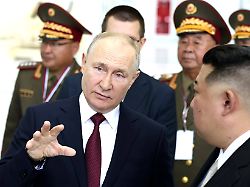Does Pyongyang have such a large supply?
If Putin wants to buy weapons in the land of milk and honey
By Frauke Niemeyer
September 13, 2023, 5:35 p.m
Russia cannot produce nearly as much artillery ammunition as it fired in the Ukraine war. Kim Jong Un’s visit opens up new opportunities for the Kremlin: North Korea is said to have enormous stocks of ammunition, but the matter is not without its catches.
A glass to the good relations between two despots – “To the future strengthening of cooperation and friendship between our countries,” said Kim Jong Un, according to Russian state television, toasting at the dinner that Vladimir Putin had hosted in honor of the ruler from North Korea.
It has been a long time since the Russian President and his visitor presented their bond as openly as they did this week. Relations were already close in the 1990s, but from 2006 onwards they became a little shy of publicity. At that time, the UN Security Council (UNSC) agreed on a ban on trade in weapons and missile technology with Pyongyang. From now on you were not allowed to sell to North Korea or buy from there. With the ban, the United Nations was reacting to a North Korean missile test, something Russia couldn’t so obviously ignore.
However, business continued under the radar. And so the subsequent UN resolutions never prevented Moscow and Pyongyang from maintaining close relations, including close ones in the arms sector. It is this closeness above all that makes the West look with concern at the good atmosphere celebrated by those present at the Russian Vostochny cosmodrome.
Russia has stood up to protect its sovereignty and security, the Russian agency Interfax quotes Kim Jong Un as saying. “We have always and will continue to support all of Putin’s decisions and decisions of the Russian government.” North Korea itself would probably also like support, for example for its satellite program or humanitarian support for the poor population. Accordingly, Kim Jong Un appears to have the will to supply weapons, as do the stockpiles and means of production – Western experts agree.
However, it is also a fact that Pyongyang has not fought a war in 70 years. What condition are the artillery weapons and ammunition that North Korea is said to have in large numbers in its depots? Can they also meet Moscow’s high demand for supplies qualitatively?
“Russia has an enormous delta”
“Ammunition for tubular artillery and rocket artillery are extremely important for Russia,” says military expert Gustav Gressel ntv.de. According to forecasts, the Russian army will fire around seven million shells this year, up from eleven million last year. The domestic arms industry produces far too few for this level of consumption – around 2.5 million per year. “So Russia has an enormous delta that is filled from its own stocks or from the depot.” A supply that is likely to run out given such high consumption figures.
The North Korean stocks seem ideal for replenishment, because Pyongyang’s army is numerically “huge,” says Gressel, “far larger than the Russian army because it has an enormously high mobilization strength.” Their weapons depots and ammunition stocks would have to be correspondingly large. The North Koreans built their army according to Soviet principles, which is why the military expert believes that the artillery units are very strong – like the Russians – and are largely still equipped with Soviet equipment from the Cold War.
“When Russia modernized its own ammunition industry, it passed on some of the old facilities to North Korea,” says Gressel, a researcher at the European Council on Foreign Relations. “This was basically Soviet production that was then continued in North Korea.” The calibers are still suitable today – be it for artillery or grenade launchers.
A huge stock of largely suitable calibers – that sounds perfect for Moscow, the only problem that could be the condition of the stocks. Because “shelf life dates” also apply to ammunition.
Anything that has been lying unused in a depot for decades shows signs of damage and becomes “unstable” due to overlay. According to Gressel, the effect has already been seen when Russia used North Korean ammunition in the past. “First, long storage causes propellant charges to become inconsistent because the propellant powder decomposes.” This ensures that the ammunition burns at different rates and the shots become less precise. In addition, there are detonators that no longer respond due to interference. “This results in a very high rate of unexploded bombs.”
A land of milk and honey for gun buyers
But such deficits in quality could be contained by sheer quantity. It is difficult to judge from the outside whether the many artillery units that Pyongyang maintains are completely equipped according to the Soviet model or whether some of them only exist on paper – to deter opponents. If the units were actually fully equipped according to the Soviet model, the ammunition supply would have to be enormous. “Then North Korea would have to have the largest ammunition reserves in the world,” said Gressel. “Theoretically, it would be a land of milk and honey.”
And the willing regime in Pyongyang could play another important role: that of the transshipment point for Chinese ammunition, which has repeatedly been captured by advancing Ukrainian troops in the south of the country in recent weeks. China could boost such shipments by sending the ammunition to North Korea, where it would be relabeled and shipped to Russia. “In this way you could keep Russia in the war, but you would be cleared in front of the Western public,” said Gressel.
So there are many opportunities for Russia to benefit from the emphasized “friendship” with North Korea. The West must fear that the mood at the Vostochny cosmodrome is actually good.
